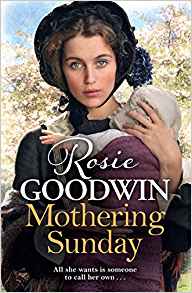Mothering Sunday
Sunday Small is named for the day she was abandoned as a newborn on the steps of Nuneaton workhouse in 1870.
We first meet her, aged ten, standing up to the sadistic matron, Miss Frost. Sunday is a good-hearted, resilient girl who abhors bullies and befriends the orphaned Daisy and Tom Branning, who have recently been sent to the workhouse. By the time she is thirteen, she has attracted the attentions of the vile workhouse master, Mr Pinnegar, and is relieved when a housemaid’s post with the flamboyant lodging-house owner, Mrs Spooner, is found for her—but she has made enemies who are prepared to bide their time for revenge.
This Victorian saga is packed with melodrama and sentimentality. We know who Sunday’s mother really is, which lends certain scenes a particular poignancy, and there is some vivid characterization—Sunday herself, Mrs Spooner, and her housekeeper, Annie, in particular. Tom Branning matures into fine hero material.
However, as a reader there was much that annoyed me. There is frequent “head-hopping” between characters within paragraphs, sometimes to people with only a “walk-on” role. We are often told, for example, that people “looked exhausted” or “felt sad” without any further attempt to describe appearance or emotion. There is a plethora of clichéd similes such as clean/bright as a new pin, still as a statue, and quiet as a mouse. Particular verbs such as scuttle (for run), trip (for walk), and hover for wait or loiter tend to distract me.
The good characters are “very, very good” and the bad—Miss Frost and Mr Pinnegar in particular—verge on grotesque caricature. The opening workhouse scenes were over-familiar. I was as glad as Sunday herself to put them behind me.










